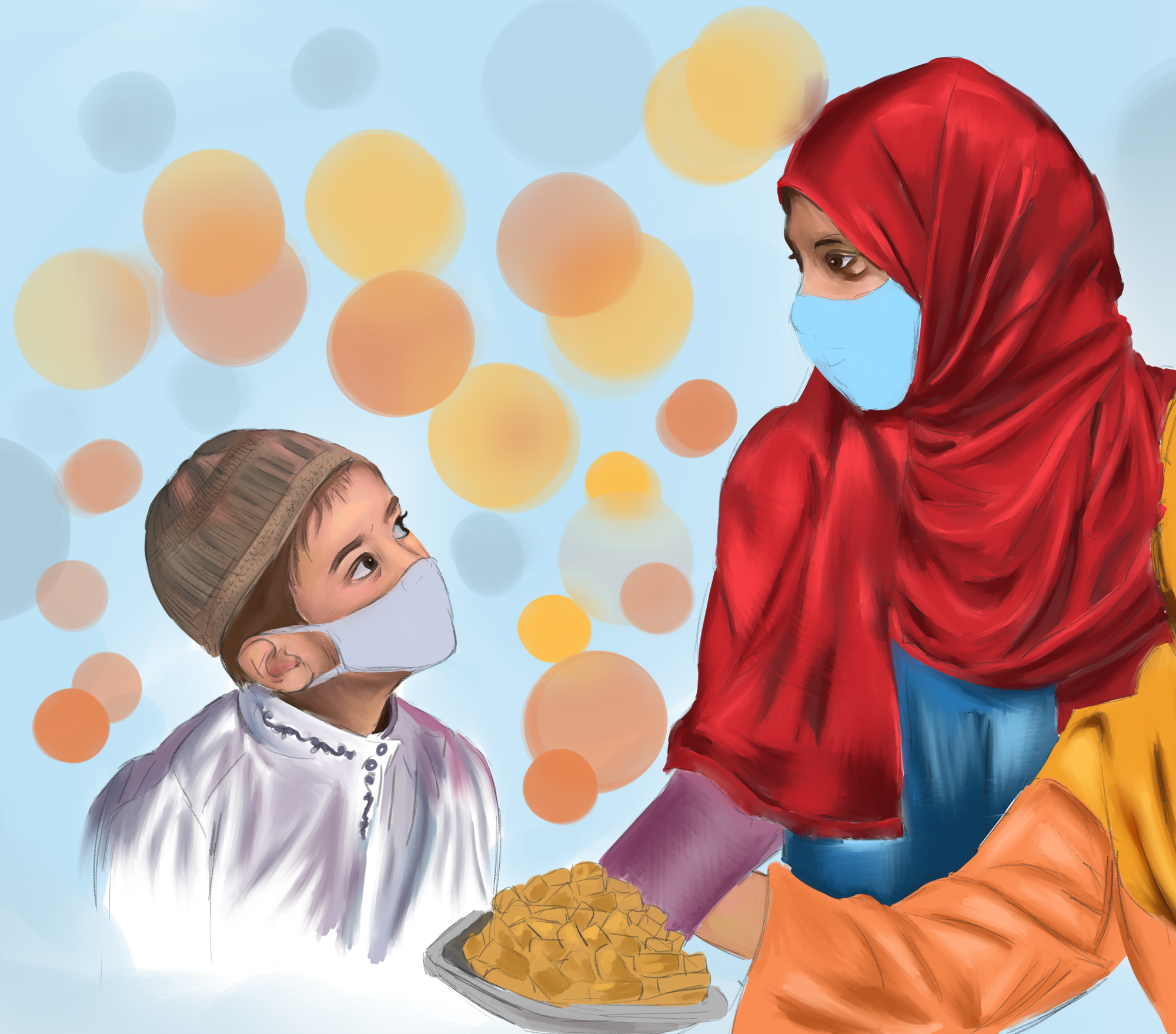
(Vaibhavi Patankar/Daily Bruin)
By Maddie Rausa, Madina Safdari
May 6, 2021 at 8:58 p.m.
This post was updated May 7 at 9:25 a.m.
In 2020, Hamza Mirza watched his younger cousin grow up over Zoom iftars, the nightly meal Muslims eat to break their fast during the holy month of Ramadan.
This Ramadan, he has the chance to hug her and his other cousins again, said Mirza, the external vice president of the Muslim Student Association at UCLA and a third-year history student.
Although not yet able to observe a fully in-person Ramadan, Muslim students are still finding ways to connect with their community safely, balance their academic and personal lives as well as reflect throughout the holy month.
Los Angeles entered the least restrictive tier of the state’s reopening plan Tuesday. Over 40% of Californians have received at least one dose of the vaccine, and all Californians aged 16 and older are now eligible to receive a vaccine. This coincides with recent lows in new cases nationwide, according to Johns Hopkins University.
As the adults in his family get vaccinated and the CDC releases new guidelines for vaccinated people, Mirza has been able to see his family more often.
Ramadan, the holiest month in the Islamic calendar, is observed by 80% of Muslim Americans according to the Pew Research Center. This year, Ramadan falls between April 12 and May 12.
Muslims who observe Ramadan spend the month abstaining from food and water from before dawn until sunset.
“It’s a time of personal spiritual growth but also a time of coming together as families, as communities,” Mirza said.
In 2020, Ramadan fell during April and May, when COVID-19 lockdown measures were in effect throughout the United States. Some students found it bizarre to observe Ramadan apart from their communities.
Mirza would normally meet at cousins’ or friends’ houses for iftar meals, but in 2020, that wasn’t possible. His family met for iftar meals over Zoom instead.
“Not being able to go to family and friends houses and stuff, that was just a weird feeling. … All those things are just part of your life. Every year, that’s what happens,” Mirza said.
This year’s Ramadan has been easier because Mirza is now accustomed to social distancing measures. The gatherings, larger than last year but still small, can be more intimate, he added.
With vaccine eligibility increasing but COVID-19 restrictions still in place, some students have opted for less grandiose iftar meals and instead gather at friends’ apartments in Westwood.
Saba Khan is the sisters’ activities director of the MSA, where she organizes events and fosters community for the women in the club. Khan, a second-year neuroscience student, is experiencing her first Ramadan away from her family home in Stockton, California.
Khan was the only Muslim among her friends growing up. College allowed her to be part of a Muslim community, she said.
Khan now breaks her fast and wakes up for suhoor, the pre-dawn meal, with her Muslim roommates.
“This year my friends got to see me fast,” Khan said. “My Christian best friend got to see me fast for 16 hours, she got to see a whole other side of me.”
Laila Shaaban, a first-year environmental science student, lives alone with her cousin in Westwood.
Unable to see the rest of their family during Ramadan, they instead invite friends over to cook, eat, pray and work on homework together.
One night, Shaaban and her cousin hosted a dinner party for Ramadan. They called their parents over FaceTime to learn how to cook traditional dishes.
For members of the MSA, Ramadan looks drastically different from when club activities were in person. Normally, the club’s Ramadan committee would plan the iftar meals months in advance, schedule catered food, book venues on campus to feed hundreds of fasting students Monday through Thursday.
Owais Salahudeen, the MSA finance director, felt most connected with the UCLA Muslim community during campuswide iftars with around a hundred other students breaking their fasts together. The fourth-year biology student found it to be his favorite time of the school year and looked forward to 4 a.m. trips with friends to Denny’s for suhoor.
Observing Ramadan also requires Muslim students to manage adherence to their faith alongside the demand of UCLA coursework. For some, virtual learning has made the home a place for school, worship and domestic responsibilities all at once.
Since mosques in her area are still only hosting online events, Atiyeh Taghiei, an Islamic studies graduate student, has found it difficult to connect with the Muslim community.
“Although I have been fasting ever since I was 9 years old, this year and last year have certainly been the most bizarre Ramadan experience that I’ve had,” Taghiei said.
Between her first teaching position, mostly synchronous classes and not consuming caffeine throughout the day, Taghiei struggles with a damaged sleep schedule and has to take things easier on herself, she said.
Taghiei recently got the chance to attend an in-person, socially distanced mosque program for the first time in a year.
“It was just nice to be in the presence of other people and feeling again like there’s a sense of community,” Taghiei said. “Because I think that’s been something difficult, feeling like you’re on your own.”
Self-control and patience are traits Khan said she has been working toward this Ramadan. Above all, she hopes to come out of the month with a better understanding of her Muslim identity.
Mohsin Ali, another Islamic studies graduate student, became a father just before Ramadan began.
Rather than rest at night, when the baby periodically wakes up and needs help falling back asleep, he saves his sleep for the early morning. By late morning, he wakes up to work on his research and prepare for teaching.
The observance of Ramadan entails additional prayers and duas, also referred to as supplications, in which Muslims reflect and ask God for guidance.
Ali has been reflecting on his gratitude for his family and how he can strengthen his relationships to be a better father, husband, son and sibling.
“Being a father, it definitely changes things,” Ali said. “A lot of times, Muslims will try to have personal goals that they want to work on during Ramadan, so I’ve been trying to improve my relationships in general.”
Because Iowa, the state where he lives, has not dealt well with COVID-19, Ali has stayed away from mosques as some of them reopened this Ramadan, he said. Nonetheless, he tries his best to do the extra nightly prayers, known as taraweeh, at home.
Mirza prays for the safety and health of people affected by COVID-19 – and for improvement in his study habits.
Shaaban prays for a return to normal classes. She feels gratitude for the experiences and lessons of the past year, such as how she can now enjoy an hourlong walk without distractions.
Though Muslims do not face the same stringent lockdown measures they did last year, this Ramadan is still far from normal, Mirza said.
“(Ramadan in 2020) was a year off from things that have become part of American Muslim culture and have been part of the culture for decades,” Mirza said. “And this year it’s a bit of a return to normalcy but also still very, very much of the times.”
